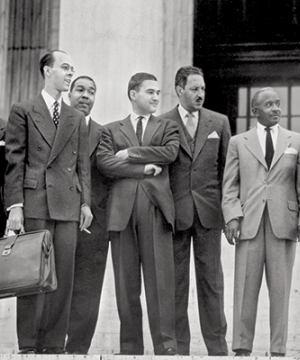Columbia Law School's Long History of Civil Rights Advocacy
Columbia Law School graduates, including Jack Greenberg ’48 (center, arms crossed), were instrumental in arguing Brown v. Board of Education, the landmark U.S. Supreme Court case that led to the desegregation of American schools. |
Founded in 1940, the NAACP Legal Defense and Educational Fund (LDF) focused its early years on dismantling segregation in the U.S. The organization filed and litigated scores of cases challenging the Supreme Court’s 1896 Plessy v. Ferguson decision, which upheld state-imposed segregation.
The U.S. Supreme Court case Brown v. Board of Education was a coordinated group of lawsuits against segregated school districts in several states, and LDF Director-Counsel Thurgood Marshall enlisted the services of a number of Columbia Law School graduates—including Robert L. Carter ’41 LL.M., Jack Greenberg ’48, and Constance Baker Motley ’46—to work on the case. Motley and Jack Weinstein ’48 drafted briefs, while Professor Charles L. Black outlined model pleadings, strategized, and worked on reply briefs. After the second round of arguments, the Court unanimously declared school segregation unconstitutional.
After Marshall left the LDF in 1961, Greenberg took over as director-counsel, continuing the LDF’s relationship with the Law School, which placed many of its students and graduates within the organization. Greenberg and the LDF went on to win several landmark civil rights cases, including Alexander v. Holmes County Board of Education, in which the U.S. Supreme Court called for the immediate desegregation of schools. The LDF’s work helped lead to integration at the University of Mississippi and the University of Alabama, and, in 1963, Martin Luther King Jr. asked that the LDF represent the Southern Christian Leadership Conference in all of its demonstration cases. Greenberg represented King and the other voting rights marchers in Selma, Alabama, in 1965.
These are just some examples of the influence Columbia Law School graduates have had on the advancement of civil rights in the United States. You can view more about the Law School’s connections to the civil rights movement via our timeline, "Crusading for Justice."
###
Posted on January 13, 2017
